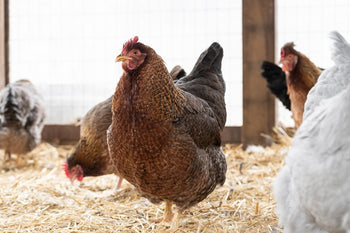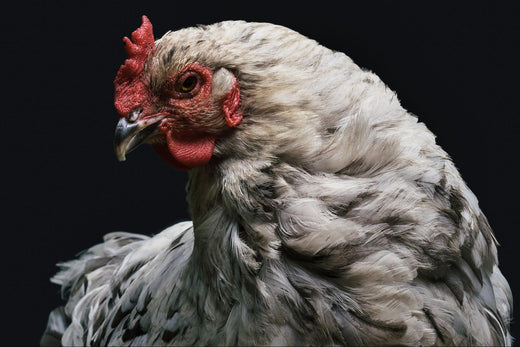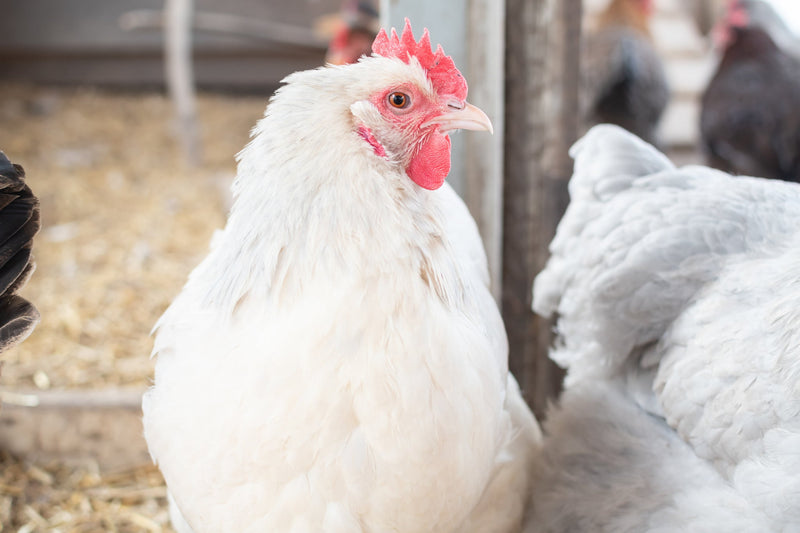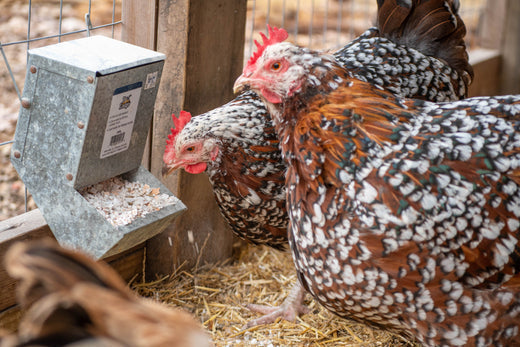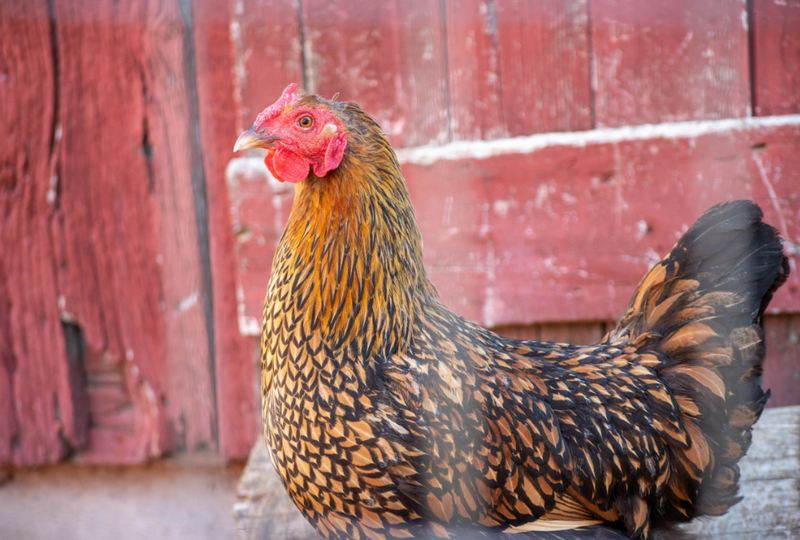Marek’s disease is not a cut and dry chicken disease. It can show its ugly head in many different forms but can also be asymptomatic (your birds can be carriers of the disease but show no symptoms). Because Marek’s disease is so fickle, it can be a challenging ailment to diagnose and worst of all, it can be fatal. Knowing how to prevent Marek’s disease and recognize some of the characteristic symptoms of the disease can help prepare you should this chicken ailment affect your flock.
What is Marek’s Disease in Chickens?

Marek’s disease is a common virus that affects few other birds or animals besides chickens. It is a complex virus that can take on many forms, ranging from no symptoms to eventual paralysis that can result in death.
Seemingly healthy chickens with a strong immune system can be affected by Marek’s disease but remain asymptomatic. Their body can be strong enough to fight against the virus and make it go dormant. Even though the chicken may show no symptoms of being affected by the virus, this chicken is still a carrier for the disease.
Chickens that are affected symptomatically will exhibit one or more of the varying symptoms of the virus.
Marek’s Disease Forms & Symptoms
Marek’s disease is a very difficult disease to diagnose in chickens. It can cause a chicken to show no symptoms, show a single symptom, show multiple symptoms, or simply show symptoms sporadically.
There are generally 5 recognized forms of Marek’s disease:
- Eye Form (aka gray eye, ocular lymphatosis)- graying & shrunken iris, irregular-shaped pupil, un-equal pupil sizes, blindness in one or both eyes
- Nerve Form (aka neural leukosis)- lack of coordination or walking stilted, muscle spasms, progressive paralysis of neck, legs or wings, weight loss, paleness, enlarged crop, gasping
- Transient Nerve Form (aka pseudobotulism)- temporary limp paralysis of neck or legs
- Skin Form (aka cutaneous Marek’s)- enlarged feather follicles (especially on legs), reddened and bloody looking shanks
- Visceral Form (aka visceral leukosis)- rapid weight loss, sometimes greenish diarrhea, massive internal tumors
Both the eye form and the skin form of Marek’s disease are rare for chickens to contract while the transient nerve and visceral form are the most common. The transient nerve form often causes sporadic symptoms and rarely leads to death. The visceral form of Marek’s disease is the deadliest and usually causes a 60-80% mortality rate, yet the eye and the nerve form of can also lead to an early death.
Different forms of the virus will cause a chicken to exhibit different symptoms. However, there are some characteristic symptoms that will be true of any chicken who contracts the Marek’s disease virus. Carriers will exhibit immunosuppression and may show frustrating come-and-go symptoms with no resolutions. Immunosuppression can be transient, which means it does not last, leaving the chicken susceptible to disease for short periods of time before the immune system becomes strong again. However, full immunosuppression is also possible, in which the chicken has no ability to fight any other diseases or parasites.
It is not uncommon for chickens affected by Marek’s disease to have slow growing tumors developing inside that are impossible to diagnose until a postmortem examination is performed.
How Common is Marek’s Disease?
Unfortunately, Marek’s disease is very common in chickens. Those more pessimistic may tell you to simply assume your flock is a carrier of the disease even though they may show no symptoms. Marek’s is so common that your entire flock has likely been exposed to the virus, but they remain healthy enough to keep the virus dormant. This is yet another reason why it’s important to invest in a feed with proper nutrition!
Marek’s disease is most common in young or growing chickens/pullets. Birds between the ages of four weeks and six months are the most susceptible while building up their immune defenses. Even though Marek’s disease most commonly affects young birds, older chickens can also contract the virus and are more than likely carriers. Stressors such as overcrowding, moving to a new location, poor coop ventilation, parasites, or even the natural process of maturing and reproducing can all make way for Marek’s disease to become active.
Even though Marek’s disease can be an asymptomatic disease, it can also cause slow-growing tumors to develop internally, making the chicken appear asymptomatic at first. As the tumors grow the chicken may slowly decline in health until the tumors become so large that they lead to death.
What Causes Marek’s Disease in Chickens?

Marek’s disease is caused by the herpes virus and is considered a viral tumor disease. The virus targets a chicken’s tumor-blocking genes and antibody-producing cells, inhibiting the ability to fight tumors or produce antibodies. Without antibodies, a chicken’s immune system is severely weakened, paving the way for other diseases and parasites to take hold.
Because the Marek’s virus impairs a chicken’s immune system, it is not uncommon for Marek’s disease to become symptomatic when the chicken is affected by other ailments, such as coccidiosis or a chronic respiratory infection. To make Marek’s disease even harder to diagnose, some of the symptoms of Marek’s disease are the same symptoms as other common chicken diseases.
It may seem as if an ailment or disease caused a chicken to get Marek’s disease, when really the virus was present all along and it became active when the chicken’s body was stressed by another ailment.
Is Marek’s Disease Contagious?
Marek’s disease is highly contagious amongst chickens. Chickens who are exposed to another chicken diagnosed with Marek’s must be considered lifelong carriers even if they show no symptoms or were even vaccinated for Marek’s disease. The Marek’s virus can survive in affected areas for at least five months and potentially up to many years.
The virus is commonly spread by chicken dander and other chickens can contract it though inhalation. Here’s some good news! Marek’s cannot be spread by means of hatching eggs, which means a hen who is a carrier of the disease will not spread the disease to her eggs. Brood young chicks away from adult chickens unless you are using a broody hen.
Chicks who are not raised by a broody hen can be raised isolated from adult birds for five months to help them overcome the virus as adults. The five month ‘quarantine’ time allows their immune systems to become strong enough to fight the virus when they are exposed. Some chicken breeds are more resistant to the virus than others. However, Silkies, Polish, Sebrights, and a few other exotic chicken breeds tend to be more susceptible to Marek’s disease.
Can chickens spread Marek’s Disease?
Chickens can only spread Marek’s disease to other chickens.
Can humans get Marek’s disease?
No, Marek’s disease is not zoonotic, which means it cannot be spread across species. The eggs and meat from chickens who contract Marek’s disease are safe to eat.
Can ducks get Marek’s disease?
No, in most cases Marek’s disease is not contagious to other domestic poultry besides chickens. Some occasional cases have been reported in quail and turkeys.
Is Marek’s Disease Treatable?

Marek’s disease is not treatable. There is no known cure for Marek’s disease, and it cannot be 100% symptomatically diagnosed while the chicken is still alive. The only way for Marek’s disease to be diagnosed positively is through a DNA blood test or a PCR test. Postmortem examinations can reveal large tumors, but there is no way to identify Marek’s disease as the cause of the tumors without a blood test or a PCR test.
If you suspect one of your chickens is showing symptoms of Marek’s disease, explore other causes of the symptom and try potential treatments since you won’t know for sure that your chicken has Marek’s disease. Here are some other poultry ailments that can mimic symptoms similar to Marek’s disease:
- Vitamin Deficiencies- learn more about dietary deficiencies here
- Avian Lymphoid Leukosis - causes emancipation due to internal tumors
- Toxicity or Poisoning - heavy metal & lead toxicity or poisoning from aflatoxins in moldy or stale feed
- Botulism - caused by a toxin that attacks the body’s nervous system
- Egg Binding - occurs when a hen is unable to lay an egg
- Hypocalcemia - often called layer fatigue and is due to dangerously low calcium levels
- Internal & External Parasites- mites, lice, & internal worms
- Ear Infections - will sometimes cause a chicken to hold its head at an odd angle
- Avian Encephalomyelitis - can cause paralysis
- Viral Tenosynovitis - poultry version of arthritis and can cause difficulty walking
- Mycoplasma Infection - a respiratory disease that can also be asymptomatic
- Bumblefoot- staph infection of the foot pad that can cause a chicken to limp or walk funny
Should I Use the Marek’s Disease Vaccination on my Flock?
The Marek’s disease chicken vaccine is available and can be administered as a preventative against Marek’s disease. Keep in mind that the Marek’s disease vaccine only works as a preventive and is NOT a treatment for Marek’s disease. Chickens can still contract Marek’s disease if they are exposed, regardless of if they have been vaccinated or not.
Chickens of any age can be vaccinated; however, the vaccine will not be effective if the chickens have already been exposed to the virus. To be the most effective, chicks should be vaccinated within 24 hours after hatching. Ideally, they should then be kept separate from any other birds as their immune system gradually builds up resistance to the virus.
The Marek’s vaccine helps a chicken gradually build up resistance to the virus. It can reduce the chances of a chicken exhibiting symptoms and can help reduce shedding of the virus through dander.
The Marek’s disease vaccine is not 100% effective. About 5% of chickens who have been vaccinated for Marek’s disease end up getting the virus anyways. As the virus becomes more common, the vaccine becomes less effective against new strains of the virus.
The MDV-3 vaccine is the most common vaccine administered to non-commercial chickens for preventing Marek’s disease. This vaccine cannot cause a chicken to be infected by the virus or spread the virus. The vaccine is derived from a natural virus carried by turkeys which prevents the Marek’s disease virus from forming tumors.
Whether you get your flock vaccinated for Marek’s disease or not is up to you. It may depend on the age of your flock and whether you think they have already been exposed to Marek’s disease or not.
Conclusion
Marek’s disease is a common virus that can affect a chicken in different forms and to varying degrees. If you suspect one of your chickens has Marek’s, it is a good idea to assume that your whole flock is now carriers of the virus. As discouraging as Marek’s disease can be, keeping your flock in good health and preventing common stressors can help prevent Marek’s disease from becoming a big issue! Keeping your flock healthy starts with quality feed and plenty of water, preventing stressors from letting Marek’s take hold. If you are concerned about your flock spreading Marek’s disease, you can always consult with your local vet or an avian vet.





